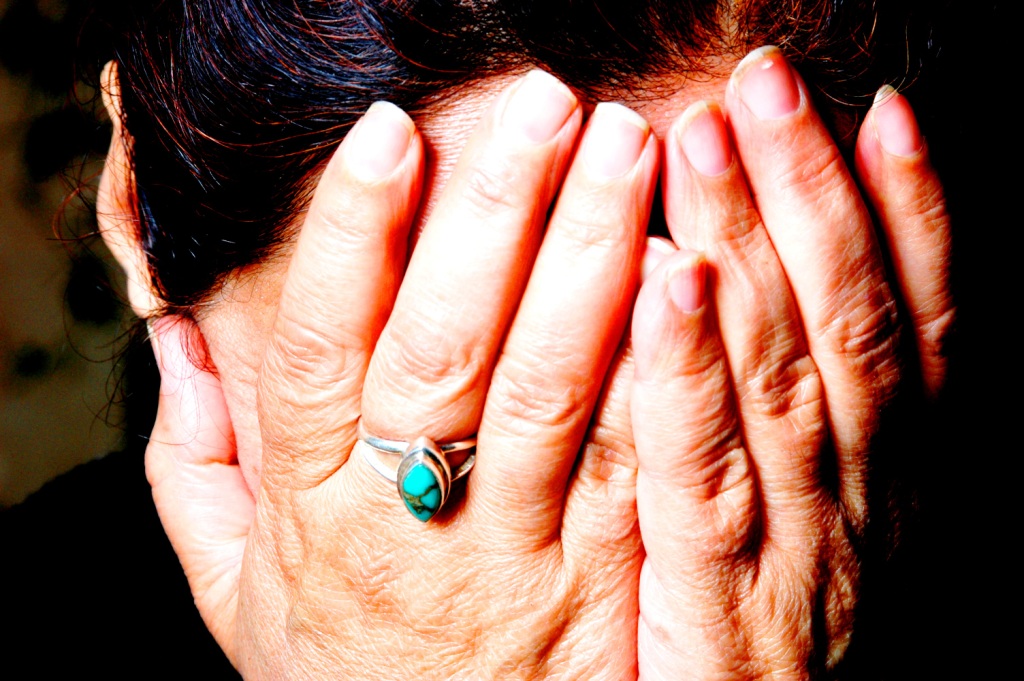” … can’t you see I’ve got
To live my life the way I feel is right for me
Might not be right for you but it’s right for me …”
“Elsewhere” by Sarah McLachlan
There was a night in late January 2016 when I needed to admit I was completely broken. I was suffering from major depression and anxiety attacks. Other than my therapist, I didn’t quite know who, or how, to say it to. Or if I should say anything at all.
I had left work for the night, and was on my way to my therapist appointment. It took all that I had to make it through that workday. I was going through the motions really — clinging on until I could make it to the therapist office. Medicines my psychiatrist had prescribed for me over the years weren’t working, and I was getting frustrated. I felt hopeless and I needed help.
When I sat down to talk to the therapist, she asked me if things had improved since our last visit. I started to break down and told her things weren’t improving at all. I told her I was getting worse, and barely clinging on.
As I was talking to her, I felt like I was admitting defeat. I couldn’t go on anymore, not like this. We talked about whether I needed to go to the emergency room, to possibly be admitted inpatient, or if a partial hospitalization was the way to go.
We ultimately decided partial hospitalization was the best choice. In the morning, I would call my HR and go out on medical leave — out of the blue. I was worried what my boss and co-workers would think. I was worried what my wife, my then 12-year-old son, other family members and friends would think.
That night, and the following morning, became the start of a long “coming out” process for me. Rather than live (or struggle to live) in the shadows, I decided I needed to start to tell people about my condition.
At first, I felt like I owed certain people an explanation for my leave of absence. I felt like I owed my wife and my boss reasons as to why I was walking away from my job, at least for the time being.
I felt very nervous about the “coming out” process. I knew that there was a stigma attached to mental health. I feared rejection. I was concerned that people would label me as weak, or strange. I felt shame before I had a reason to feel ashamed. In a way, I was stigmatizing myself.
I started out slow, and small, by telling people about my mental health. Other than letting my wife know the extent of my depression, I felt like I needed to be open and honest with my boss. Thankfully, she was very supportive. I then received a text from a friend/co-worker, asking if everything was okay. I really wanted to tell her what I was going through. But I was afraid of what she would think. I ended up giving a vague answer about starting to get the help I needed and gave her a sincere thanks for checking in.
I became a little more comfortable talking about my depression and anxiety once I started a partial hospitalization program, Group therapy sessions gave me an opportunity to talk about my feelings in a safe place, with fellow patients who could understand and relate to what I was going through.
While out on leave, I started to “come out” to some more friends and family members. Some of those admissions were in the form of phone calls, others in the form of texts/emails. Some people were very supportive. Others did not respond at all to my texts/emails. Those non-responses stung. I interpreted those non-responses as rejections. In my mind they thought of me as as crazy, weak or lazy. Some of those non-responses were from people I was sure would be supportive – perhaps that’s what stung the most.
A pivotal “coming out” conversation for me occurred between myself and a cousin and aunt. By talking with them, I was able to confirm a suspicion I had all along: that mental health issues ran on my Mom’s side of the family. This conversation helped me begin to build a new understanding and framework of who I am.
I became inspired to follow certain organizations and advocates on social media. I even started to “like” and “share” some mental health news/columns that were of interest to me.
My leave of absence ultimately lasted three months. Upon my return to work, my co-workers were extremely supportive and welcoming, whether they had an idea as to why I was out on leave or not.
I still feel like I have a lot more work to do to be comfortable in my “new normal” or my new skin. I still feel shy sharing my condition within my personal network. I fear being labeled with stereotypical terms. I’m afraid people won’t be comfortable acknowledging or talking about my conditions. I fear the non-responses, and/or the conversation changers.
As I continue to currently battle depression, my psychiatrist recently recommended Transcranial Magnetic Stimulation (TMS) therapy. The TMS therapy will take me out of work for significant portions of each workday for the next six weeks or so. I would be interested in any feedback anyone has to offer in terms of communicating the need for further care to your work network (boss, co-workers, etc.) I assume co-workers will speculate as to why I disappear for long lunches each workday for the next six weeks. I’m not sure if or how to handle that speculation.






This is the conversation we all need to be aired. So many people keep mental health unspoken yet we have no problem talking about our physical health in every detail. Nobody would question health appointments needed for physical ailments. Any time off from work for appointments for mental health should be treated the same way. I have huge respect for your honesty – society needs this to give others the courage to be open about their own mental distress. I hope your health continues to improve, wishing you all the very best.
Ursula, thank you very much for your comment. I greatly appreciate the well wishes. It is my hope that mental illness becomes thought of as what it is — part of a physical illness as well. It’s really helpful to get feedback from people that can relate to the issues. Thank you.
You have a lot of courage and that is what is needed more from other people with mental health issues….to speak up and challenge the prevailing stigma…. Although things are getting much better we still have a way to go.
Again thank you for your honesty and courage and never give up. It always gets better
Greg, thank you for your very kind words. In some ways, I’m finding that speaking up is a small part of the healing process. But there does seem to be a risk there — you never know how someone(s) will react. It’s good to know there are people out there like you who are supportive.
Many years ago, I went out on maternity leave early (5 months along). When I returned months later after having my son, people asked me how my back was. I laughed and said fine, realizing that most people didn’t even know that I had gone out on maternity leave. It’s amazing what we build up to think that others think about us, and that they really don’t. They’re too busy with their own lives. Don’t worry about the speculation. Explain your absence in the shortest way possible and use the same answer for most everyone. As several people joke with me, ‘It’s not about you’. You’ll get through this!
Thank you! I have found in general most people don’t ask. It’s kind of like a “Don’t Ask, Don’t Tell” policy. When I did come back from my leave, the people that did ask questions mostly just asked if I was okay – and I just simply said yes. The challenging part is trying to keep a brave brave Face on during the days when everything isn’t okay. But I am getting through this and the kind words definitely help – thank you!
Hi Andrew. First I want to send you blessings for healing you. I do not have your disorder, but it runs in my family and some of my family members have your condition. Yes, it can be so scary when it pops up with a vengeance for sure. You asked about TMS. I don’t know about any experience with TMS, but I do know what happens when some of my family had ECT. I do know they try medication first, TMS second and ECT last. The ECT does work, yet there are side effects. Short term memory loss. My one cousin really did not like that. Grateful that the depression and anxiety was able to be controlled again with medication, the memory loss was a loss. I understand TMS does not have that great a side effect, but I can tell you that being able to have your feelings in control again may be ideal for you. From one who watched her family have these episodes and seeing the change in them after treatment, was a blessing to see them be able to be in control of their mind. To see them have happy episodes and feel that you can actually support them now is really important for relationships. It hurts so much when you try to help and just can’t help those you love. I don’t want to put any guilt on you, but the helplessness that your loved ones feel along with you is real. Just know that they feel just as helpless as you do when this happens. They are standing with you even though you may not be able to know it. Just wanted to share that perception with you form one who has watched and stood beside.
Hi Susan, thank you for your response and blessings. It is very interesting to hear from the perspective of someone who supports family member(s) who have mental illnesses. As I understand it TMS is an alternative to ECT, but I can see that TMS would be tried first before ECT. I have heard that a side effect to ECT is memory loss. I have had some close family members say that it is a helpless/frustrating feeling to know/feel like there is nothing you can do to help someone who has depression/anxiety. Thank you for sharing your perspective — I greatly appreciate it.
God Bless you Andrew. Thank you for having the strength and courage to share your mental health experiences and concerns with others. Your words provide comfort and hope.
Phylann, thank you for the very kind words. They mean a lot.
Thank you for sharing this Andrew. I lost my mom two years ago and had depression and anxiety attacks. Initially, I would go home to my empty apartment to avoid sharing with others for fear of seeming weak. Your words provide comfort to others who are going through these emotions and letting them know that it is okay to make it known.
If more people shared, perhaps we could see that we all are more similar that we think, and stigmas could be erased.
Thank you Malinda. Losing a parent is extremely tough, and I think the only ones that can truly relate are those that have experienced the loss themselves. There are still some things that I have a hard time sharing for fear of seeming weak or being judged harshly. But hopefully little by little in each of our own ways we can share with others, even if it is simply a therapist or psychiatrist, to lead towards healing. Thank you Malinda.
Hi Andrew,
You are not alone in this and it occurs far more than anyone actually knows. While I cannot possibly understand what you are experiencing, I do know of a few people going through this. Just today a friend of mine came out and told the world. The outpour of support for him was incredible.
Stories like yours need to be shared and I hope that you continue to raise awareness for it.
Take care of yourself,
Joel
Joel, thank you for your comments and kind words. I greatly appreciate the support. I have found, and do think, that when people do open up about their mental health conditions, most people are very kind and supportive. What does give me pause is when celebrities, politicians, etc., act “crazy” and you’ll see comments from friends/family on social media labeling those celebrities/politicians as “insane”/”crazy.” But I think as more people (celebrities included) talk about their struggles openly, the more compassion and awareness will be built. Thank you once again for your kind and supportive words.
Hi Andrew,
My 32 year old daughter had TMS, It did help her but not to the extent of not being depressed, or not taking medication. Besides depression, she has a lot of behavioral issues. Over the years, she has been diagnosed with ADHD, Depression, Bipolar, Borderline personality and other things. She went through TMS two years ago. At the moment, she is relatively stable.
It took me a long time before i was able to talk about her mental conditions with family and friends. And there has been friends that never asked me about her again, but i think they dont know how to respond and what to say. They are uncomfortable with the topic of mental health.
I wish you the best.
pratima
Hi Pratima, thank you for sharing your story and your daughter’s story. I had not heard of TMS myself until about a year ago. Unfortunately, my insurance only recently started covering TMS. From what I understand, TMS can have varying levels of effectiveness depending on the individual. I do think that so far it has helped with some of my depression — I have been diagnosed with Borderline Personality Disorder as well. I’m not sure whether I will be able to taper down on my medications or not. I can imagine and empathize with why it would take you a long time before you were able to talk about your daughter’s mental conditions with family and friends. I have learned from personal experience that mental health issues have an impact on the entire family as well as friends. There are friends of mine that I told about my mental health conditions who have not brought it up with me again (at least so far). Perhaps it’s their way of respecting my privacy, or perhaps they are uncomfortable talking about something they view as so personal. I do agree with your assumptions in your instance and I do think it’s important for you to have someone(s) and/or a forum for you to talk about your experiences as well. I certainly wish you the best as well Pratima. All the best to you as well as your daughter – Andrew
Andrew,
Reading your comments here, i would have never guessed that you could have BPD. Your story also gives me a lot of hope for my daughter. She never talks about her diagnoses or her feelings except when she is real depressed, she will say it. Right now she is stable. Takes a lot less time for her emotions to come back to base line. Years of DBT has helped.
Take care.
Dear Mr.Giddings,
First off, I would like to say thank you for sharing your story. It takes courage to share such story since some people don’t actually understand what depression is really like.
Second of all, I want to say that you HELPED me. It really did. Your story helped me realize that I am not alone. I’ve been depressed since I was in junior high. Since then I had not had the courge to tell my friends and my family about my depression and anxiety (and suicidal thought). This is because in my country depression is considered as mental illness. However, in my family particularly, we don’t talk about depression so I kind of bottle things up. I have not had the thought of “coming out” but someday I think I will.
Finally, once again THANK YOU very much for showing and convincing us that there is always light at the end of the tunnel. Your words give me hopes. I will pray for you and take care of yourself.
Levan
Levan,
Thank you for writing. Your comments help me — I greatly appreciate it. Your words mean a lot. It took me a very, very long time to get to the point where it even occurred to me to use writing as therapy. In fact, it took a therapist to suggest it to me, even though I enjoy writing.
I empathize with your reservations and feelings about opening up to family and friends about your depression. In a lot of ways and with some family members/friends, I still keep some things bottled up too. I can imagine there may be cultural/social differences between your country and the states, but I’ve found that I was in some cases pleasantly surprised with some people I confided in. What I have found, through sites like this and similar sites, is there are networks out there where people can connect on some level.
I pray for you as well Levan – your response was extremely heartwarming. Thank you.
Dear Andrew,
Last year I suffered from a depression. I know your feelings. I know that in some moments you might believe, that you are not capable of doing anything. That some time it seems that habits and ways of thinking are so strong that you cannot get out of there.
I decided to confront myself. Now, when I think back, I almost piss in my pants. I went through so many moments where I had to be stronger than the feeling. Stronger as I believe that I can be. And it was totally worth it. I got accepted into an acting school, which is not that easy. I got in the first time I applied. This is almost a miracle. I also got accepted to a theatre project where I am gathering right now my first real experiences as an actor.
Now to break almost hollywood bullshit side of my story: altough I have success in what I am doing. And altough I am doing much better than for a long time, I still get anxious and sad this winter. It comes back to me. Feelings of isolation and giving up. Almost every day in this project I am doubting the path I am gonna take.
Is this really the right thing for me? Will I earn enough money (obviously this is a question which is simply to answer with a no)? Will I be able to be a good father? A good husband? Bla bla bla. I guess everybody has these questions. But I am sure that for some people it is more of “I m going down right now” than it may be for other people. What I want to write to you is, that no matter what, everything will pass. Moments of happiness will pass and so will moments of sadness and anxiety. There is something that keeps you alive. And this way you re going is meant to be dealt by you alone. Take the support you need and say the things out you want to. Make mistakes and learn from them. As long as you keep moving, you wont be stuck in the same place with the same problems. I am sure that you also had moments where you realized that you have the same difficulties but that they are showing in a different way.
We are always changing, and taking the risk to fall because of your will to change is definitely worth taking!
You are never really alone!
Yan,
Thank you for your comments and your words of encouragement. Thanks for sharing your story of pushing through towards acting school and keeping moving. I am right around my one year anniversary of when I went out on my medical leave from work. There are certain things/moments this time of year, with the winter, that remind me of how I felt when I went out in that leave. Sometimes when I sit at my work desk or sit at home my mind wanders back and the anxiety kicks in. But I try to focus on work, on friendships in the office, and my family and my writing. I take your words to heart and I think it’s good advice to stay busy and focus on other things. One thing I need to revisit is mindfulness, which I learned a bit about last year – about staying in the moment. Perhaps that’s something you would relate to from an acting perspective. Thank you once again for your words of encouragement Yan and I wish you all the best in your acting career.
Take care,
Andrew